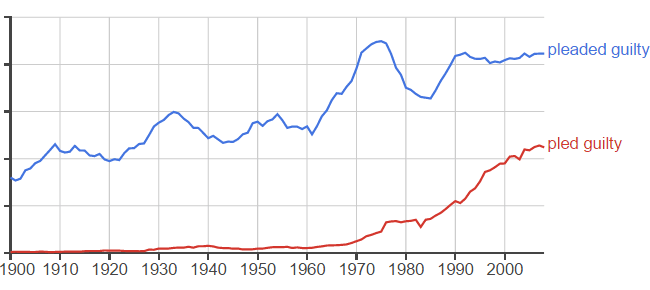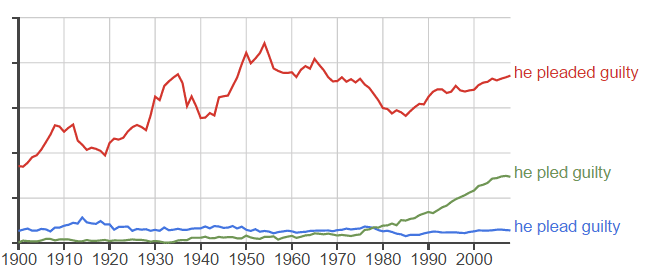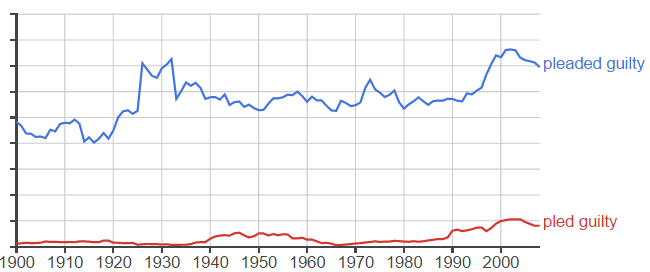If you “plead guilty”, it means that you state in court that you are guilty of a crime. So far, so good, but what if the action took place in the past—does that mean that you pleaded guilty? Or pled guilty?
It may surprise you that the only form considered correct by traditional grammarians is “pleaded guilty” (pronounced PLEE-did). However, “read” and “lead” (and related forms like “unread”), which are the only other English verbs ending with “ead” pronounced as /iːd/ (“eed”), both change to /ɛd/ (“ed”) in the past tense—so why not “plead”?
Furthermore, several -eed verbs also change to -ed (e.g. bleed – bled, breed – bred, feed – fed), so the change is phonetically justified. There have even been online polls indicating that most Americans prefer “pled” to “pleaded”. So, why do grammarians keep telling us that “pled” is wrong?
The reason is that when grammarians say that something is “wrong”, what they actually mean is that it is “non-standard”, and since English does not have any organization regulating the “standard”, it usually boils down to what influential style guides, such as the Chicago Manual of Style, have to say about the issue.
When a significant change (such as a new irregular past tense of a verb) is introduced into the grammar of spoken and informal written English, manuals of style are generally reluctant to include the new variant in their guidelines until it has been popular for such a long time that it can itself be considered “traditional”. And, indeed, the Chicago Manual of Style tells us to avoid “pled” completely.
The use of “pled” is a relatively recent phenomenon. It was almost nonexistent in English literature until the 1970s, when it started to become more popular in American literature, and its popularity has been rising ever since. According to the Google Ngram Viewer, for every two instances of “plead guilty”, there is more than one instance of “pled guilty” in contemporary American literature, even though style guides followed by many proofreaders discourage its use:

Furthermore, some people pronounce the past tense as “pled” but spell it “plead”, so it can be recognized only in the third person singular (just like in “he read”). The following graph shows the relative frequencies of the three variants combined with “he”:

Such usage has been more common historically than “pled”, but it has been slowly waning. It is likely that if one of the spellings becomes standard in the future, it will be “pled”, not “plead”.
The picture is somewhat different in British literature:

As you can see, “pled” is much less used in British English than in American English (the ratio is about 1:8, compared to 1:2 in American literature, and some of those occurrences are just British reprints of American titles).
Conclusion
“Pled guilty” is so widespread in American literature that the (also widespread) position that “it is just wrong” is not tenable. It is non-standard in terms of what American manuals of style recommend, but it cannot be considered non-standard in terms of actual usage.
In British English, while the form “pled” also exists, it is significantly less common than in American English. If you write an essay or a legal document in British English, avoiding “pled” seems to be recommendable; otherwise you run the risk of being accused of using Americanisms.
 Tip: Are you a non-native English speaker? I have just finished creating a
Tip: Are you a non-native English speaker? I have just finished creating a  Web App
Web App
